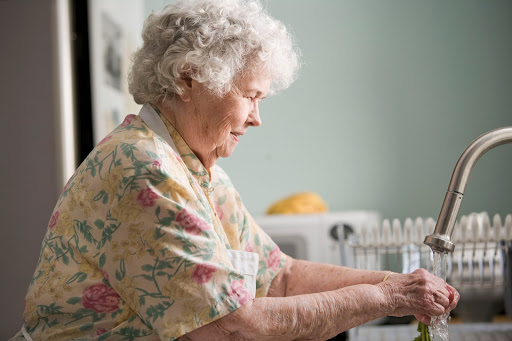
A natural part of the aging process is that our body’s immune defenses begin to change and grow weaker the older we get. That’s why, according to the Centers for Disease Control, people who are 65 and older get the brunt of flu season every year.
Five Flu Prevention Tips For Seniors
It’s important to know what simple prevention tactics you can do to stay healthy. In this article, we will guide you through five things every senior should know about the flu to ensure they are doing everything possible to stay healthy.
1. The Flu Vaccine is the best protection from the flu.
The CDC recommends that everyone over the age of 6 months old should be vaccinated against the flu. Vaccination is a great way to prevent sickness. The flu vaccination is especially important for anyone 65 and older, though. This population is considered “high risk” when it comes to potential complications from contracting the flu.
Because of age-related changes in the immune system, people who are 65 or older may not respond as well to the vaccine as a younger population. However, studies have still consistently shown that the flu vaccine is effective in reducing the risk of medical complications and hospitalizations associated with the flu. Since it’s estimated that 50% – 70% of hospitalizations due to flu are in this age group, getting the vaccine is the best way to stay healthy.
2. Washing your hands often is vital.

Good hand hygiene is the next best thing after getting a flu vaccine to prevent the flu. Why is that? Well, germs can live on surfaces like doorknobs, handrails and countertops for up to two hours. During flu season, making sure you kill these germs you get through contact is absolutely essential.
To make sure you are adequately killing these germs, you should wash your hands several times a day with soap and warm water for 15-20 seconds. Just to make sure you’re doing it for the right amount of time. (To be sure, you can sing “Happy Birthday” to yourself twice while you scrub.) Make sure to get both sides of your hands and between your fingers.
If you don’t have a sink handy, you can use alcohol-based hand sanitizer in the meantime to reduce your risk of infection.
3. COVID-19 and the flu are two different viruses.
Going into flu season during a global pandemic makes things especially nerve-wracking for everyone. However, seniors are considered a “high risk” population for both viruses, so for them, it’s particularly stressful and important to keep safe.
Both COVID-19 and the flu are respiratory illnesses, but COVID-19 has been known to spread faster and easier than the flu and symptoms tend to last longer. After those differences though, both viruses have a lot of the same symptoms including:
- fever or feeling feverish
- chills
- cough
- sore throat
- runny or stuffy nose
- muscle or body aches
- headaches
- fatigue
According to doctors, it is possible to be infected with both viruses at the same time. That’s why if you’re 65 or older, getting a flu vaccine is even more important this year. Since Covid vaccines are rolling out, make sure you get one as soon as you can.
4. There are easy, holistic ways to help avoid getting sick.
While changes in your immune system are normal with aging, that doesn’t mean there isn’t anything you can do to help boost it when it needs it most. There are simple things you can do to supercharge your system and give it a better chance of fighting off the germs. Some of these include flu prevention tips include:
- Exercise. Moderate exercise can boost your immune system and reduce your risk of getting sick by up to a third. Even if you don’t have a lot of time or physical endurance, any amount of regular exercise will benefit your immune system.
- Drink lots of water. Keeping your body hydrated is especially important during flu season. Water and tea are best for keeping your body in its best condition to fight off germs.
- Put more protein and Vitamin C in your diet. Getting additional nutrients through food is best. However, supplements also work. Talk to your doctor about how much protein and Vitamin C you should be getting each day to stay healthy.
5. Avoidance is best, but treatment is available.
Sometimes you do everything you’re “supposed” to do and still wind up getting sick. If you do contract the flu, you should be extra vigilant about getting treatment and keeping an eye out for warning signs of complications.
Treatment should begin as soon as possible since antiviral drugs work best when started within 48 hours of the start of symptoms. These drugs can make your flu illness milder and make you feel better faster.
While you recover, you need to be vigilant of warning signs that you should seek medical treatment right away. Some of these include:
- difficulty breathing or shortness of breath
- persistent dizziness, confusion, or inability to arouse
- not urinating
- severe weakness or unsteadiness
This flu season is particularly stressful for a variety of reasons, but for seniors over the age of 65, it’s more important than ever to make sure you are doing everything you can to keep yourself safe and healthy.
Elder Care Alliance has been helping to keep seniors healthy in California for more than twenty years. If you’re interested in learning more about one of our five senior communities, please schedule a visit or check out our website for more information.




















